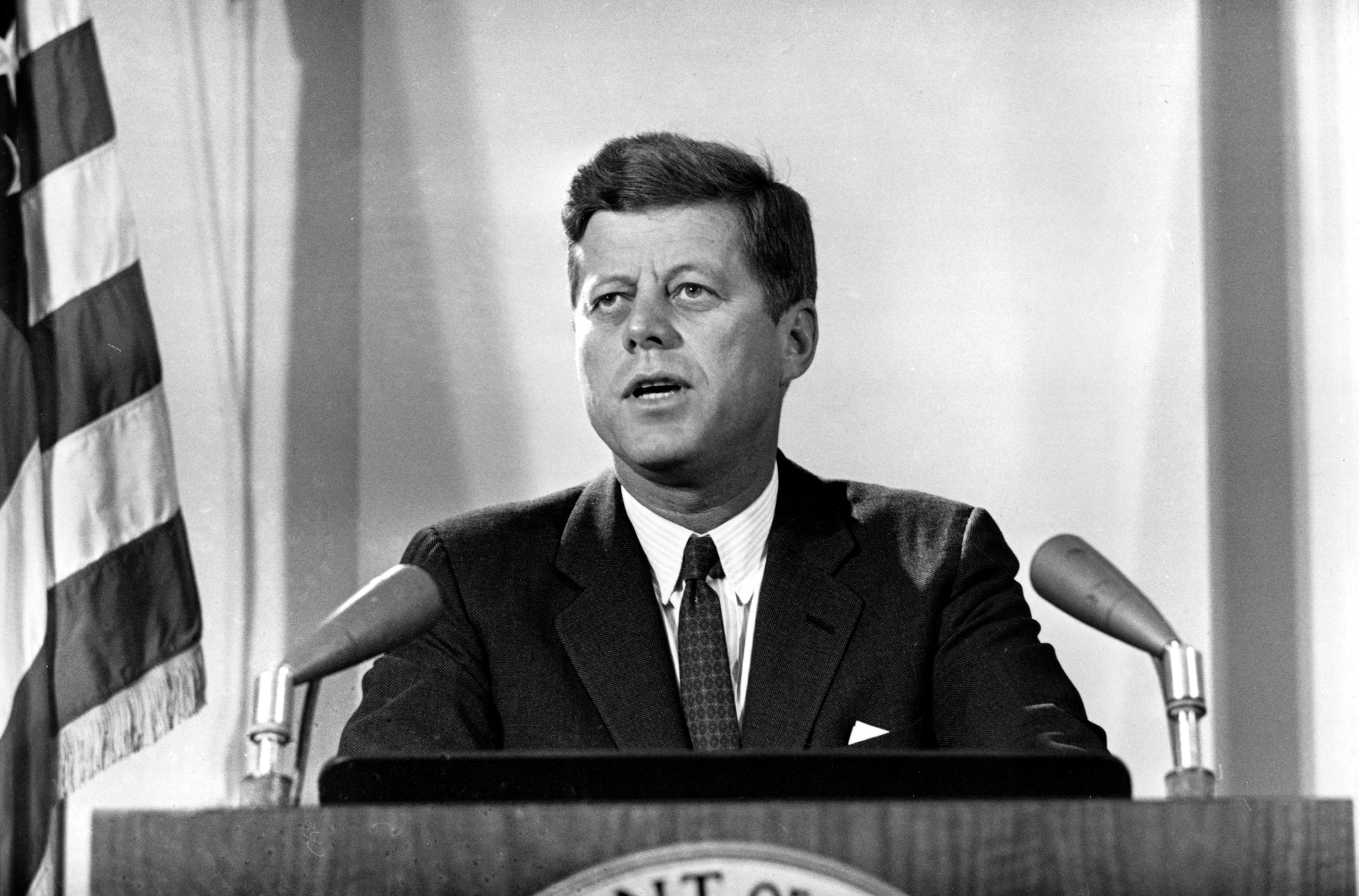- John F. Kennedy, the 35th President of the United States, was assassinated 54 years ago this Wednesday.
- During his short presidency, he served at the height of the Cold War, oversaw the Cuban Missile Crisis, and supported the Civil Rights movement.
- We put together a selection of his quotes about leadership.
John F. Kennedy, the 35th President of the United States, knew a thing or two about leadership.
During his short presidency, he served at the height of the Cold War, oversaw the Cuban Missile Crisis, and supported the Civil Rights movement.
He was assassinated 54 years ago this Wednesday, but his observations and comments about integrity, leadership, and human rights endure.
We put together 14 quotes from the president about leadership below.
"The rights of every man are diminished when the rights of one man are threatened."

He continued:
"One hundred years of delay have passed since President Lincoln freed the slaves, yet their heirs, their grandsons, are not fully free. They are not yet freed from the bonds of injustice. They are not yet freed from social and economic oppression. And this Nation, for all its hopes and all its boasts, will not be fully free until all its citizens are free."
JFK said that line while delivering the Civil Rights Address over radio and television on June 11, 1963, in which he proposed the Civil Rights Act of 1964.
"The times are too grave, the challenge too urgent, and the stakes too high — to permit the customary passions of political debate. We are not here to curse the darkness, but to light the candle that can guide us through that darkness to a safe and sane future."

JFK said that line in his presidential nomination acceptance speech on July 15, 1960.
"For courage — not complacency — is our need today. Leadership — not salesmanship. And the only valid test of leadership is the ability to lead, and lead vigorously."

JFK said that line in his presidential nomination acceptance speech on July 15, 1960.
"Dante once said that the hottest places in hell are reserved for those who, in a period of moral crisis, maintain their neutrality."

The John F. Kennedy President Library & Museum points out that Dante actually never said that verbatim, although he does allude the idea in one scene of his "Inferno."
JFK said this at the signing of a charter establishing the German Peace Corps in Bonn, West Germany June 24, 1963.
"Let us not think of education only in terms of its costs, but rather in terms of the infinite potential of the human mind that can be realized through education. Let us think of education as the means of developing our greatest abilities, because in each of us there is a private hope and dream which, fulfilled, can be translated into benefit for everyone and greater strength for our Nation."

JFK said this in his proclamation on American Education Week, 1961, on July 25.
"Freedom is not merely a word or an abstract theory, but the most effective instrument for advancing the welfare of man."

JFK said this in a message to the Inter-American Economic and Social Conference at Punta del Este, Uruguay on August 5, 1961.
"United, there is little we cannot do in a host of cooperative ventures. Divided, there is little we can do — for we dare not meet a powerful challenge at odds and split asunder."

JFK said this in his inaugural address on January 20, 1961.
"The problems of the world cannot possibly be solved by skeptics or cynics whose horizons are limited by the obvious realities. We need men who can dream of things that never were and ask 'why not?'"

JFK said that line in an address before the Irish Parliament in Dublin on June 28, 1963.
"...civility is not a sign of weakness, and sincerity is always subject to proof. Let us never negotiate out of fear. But let us never fear to negotiate."

JFK said this in his inaugural address on January 20, 1961.
"...what does truth require? It requires us to face the facts as they are, not to involve ourselves in self-deception; to refuse to think merely in slogans. If we are to work for the future of the city, let us deal with the realities as they actually are, not as they might have been, and not as we wish they were."

JFK said the above quote in an address to students at West Berlin's Free University on June 26, 1963 during his visit to Berlin, Germany.
"No President should fear public scrutiny of his program. For from that scrutiny comes understanding; and from that understanding comes support or opposition. And both are necessary."

He continued:
"This Administration intends to be candid about its errors; for as a wise man once said: "An error does not become a mistake until you refuse to correct it." We intend to accept full responsibility for our errors; and we expect you to point them out when we miss them."
JFK said that line in an address before the American Newspaper Publishers Association (ANPA) on April 27, 1961.
"The time to repair the roof is when the sun is shining..."

He continued:
"We sometimes chafe at the burden of our obligations, the complexity of our decisions, the agony of our choices. But there is no comfort or security for us in evasion, no solution in abdication, no relief in irresponsibility."
JFK said this in his second State of the Union address on January 11, 1962.
"A man may die, nations may rise and fall, but an idea lives on. Ideas have endurance without death."

JFK said this in remarks for the opening of the USIA Transmitter at Greenville, North Carolina on February 8, 1963.
"For of those to whom much is given, much is required."

"And when at some future date the high court of history sits in judgment on each of us - recording whether in our brief span of service we fulfilled our responsibilities to the state - our success or failure, in whatever office we hold, will be measured by the answers to four questions:
First, were we truly men of courage - with the courage to stand up to one's enemies - and the courage to stand up, when necessary, to one's associates - the courage to resist public pressure, as well as private greed?
Secondly, were we truly men of judgment - with perceptive judgment of the future as well as the past - of our mistakes as well as the mistakes of others - with enough wisdom to know what we did not know and enough candor to admit it?
Third, were we truly men of integrity - men who never ran out on either the principles in which we believed or the men who believed in us - men whom neither financial gain nor political ambition could ever divert from the fulfillment of our sacred trust?
Finally, were we truly men of dedication - with an honor mortgaged to no single individual or group, and comprised of no private obligation or aim, but devoted solely to serving the public good and the national interest?"
JKF said this in an address to the Massachusetts State Legislature, a few days before his inauguration.

